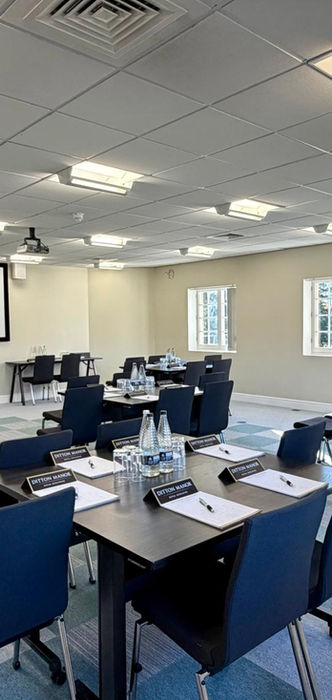MEETINGS & EVENTS

OUR INNOVATIVE CLIENTS
OUR INNOVATIVE CLIENTS

EXCEPTIONAL SETTINGS FOR REMARKABLE OUTCOMES



Think, plan & inspire.
A PLACE TO MAKE THE IMPOSSIBLE, POSSIBLE.
Set within a private, gated estate just minutes from Windsor and Heathrow, this extraordinary venue combines historic elegance with modern functionality to create a truly distinctive setting for corporate events of all kinds.
Ditton Manor is a world-class venue for innovative and inspirational meetings.

One venue, many choices.
HISTORIC, ULTRA MODERN, OUTDOORS.
Choose from:
-
Our historic Grade II manor house
-
Ultra-modern Southgate business centre
-
Garden Marquee (permanent, self-contained structure)
Ditton Manor is where conversations carry weight, partnerships take shape, and agendas move forward, all within a setting that quietly reminds you that great things happen in extraordinary places.


All trademarks are the property of their respective owners. The appearance of these trademarks in this brochure does not imply any affiliation with or endorsement by the trademark owners.


The garden marquee.
UNMATCHED CANVAS FOR ANY IMAGINATION.
Our 900 sqm permanent structure, the Garden Marquee, can accommodate 600 people in a banquet layout and 900 in a theatre layout.
The entrance lobby is perfect for use as a registration area or as an ideal spot to relax on the sofas.
The marquee features integrated sound and lighting systems, as well as toilets, and the space can be branded for your meeting or event.
This fully flexible marquee is ideal for large meetings, exhibitions, product launches, corporate evening events, and Christmas parties.
Adaptable spaces.
MAKE IT YOUR OWN.
Originally a noble residence with centuries of story woven into its walls, Ditton Manor has been thoughtfully restored to meet the demands of today’s business world.
Behind its stately facade lies a collection of adaptable event spaces equipped with the latest technology, offering the flexibility, security, and privacy that discerning clients expect.


Unmistakably Ditton Manor.
Unmistakably Ditton Manor.
UNMATCHED EXPERIENCE.
The atmosphere that sets Ditton Manor apart is a sense of calm sophistication, where past and present harmonise, allowing ideas to surface and decisions to be made with clarity.
Whether you’re gathering for a board meeting, a multi-day conference, or an exclusive networking event, the surroundings do more than impress; they elevate the entire experience.
Relax, revive, network.
FIND YOUR ZEN.
Step into a calm and inviting space designed to help ideas flow naturally.
The Southgate Business Centre breakout room combines soft, balanced tones with modern comfort, creating an atmosphere that encourages connection, collaboration, and clarity.
Whether you’re taking a moment to unwind between sessions or continuing the conversation over coffee, this is where productivity meets ease.

WHERE GREAT TEAMS COME TOGETHER





















































































